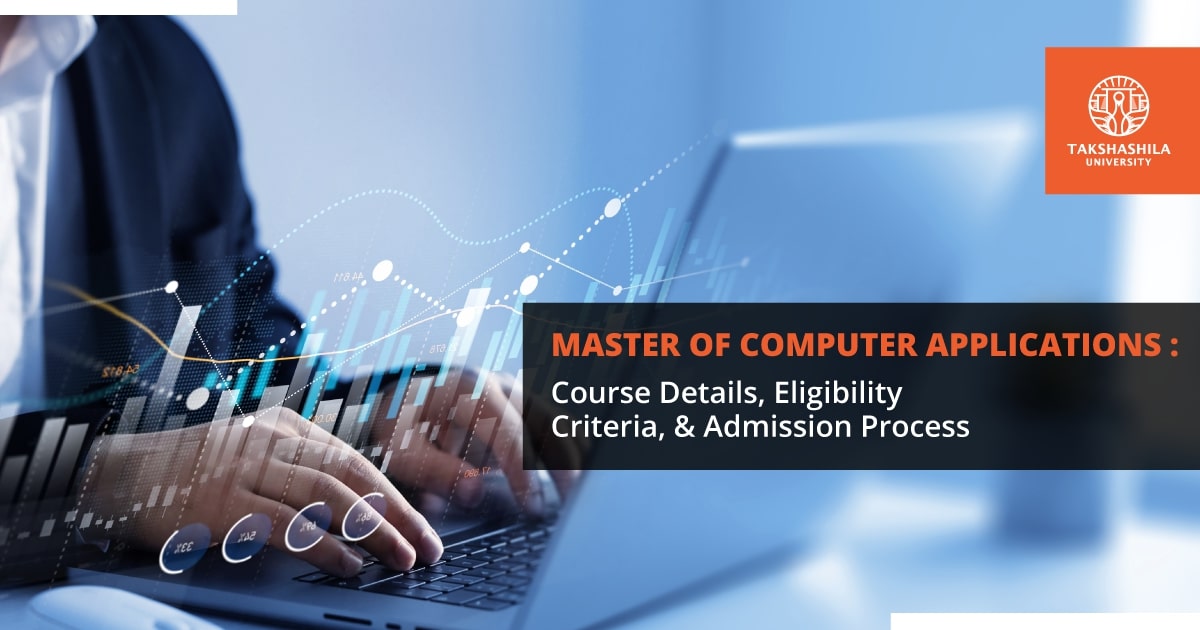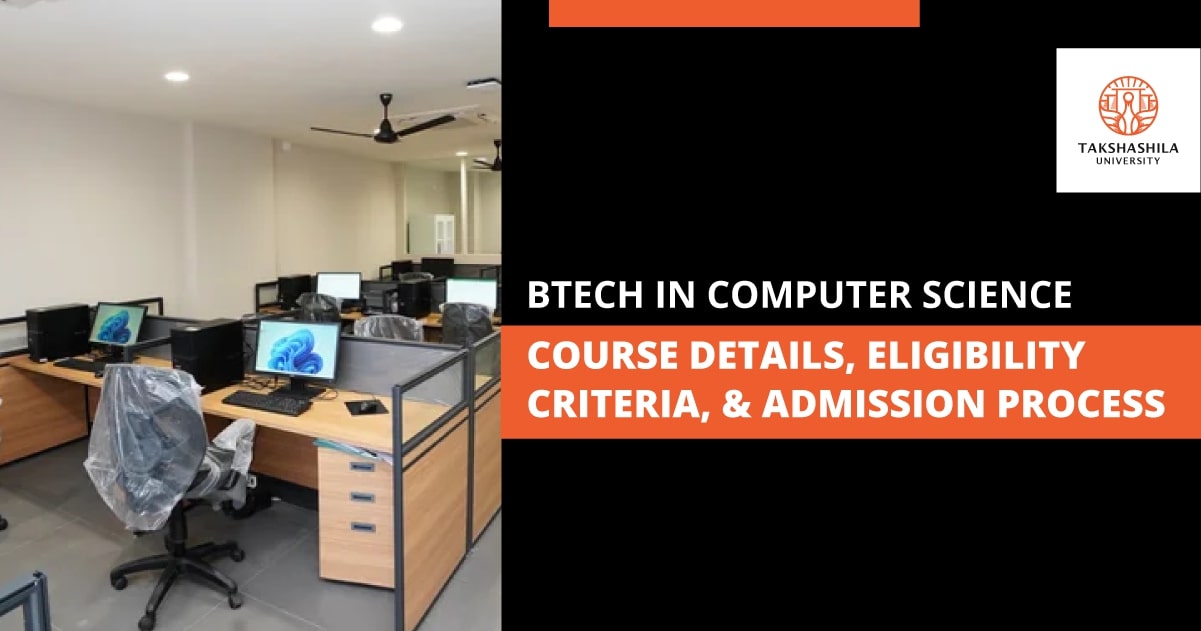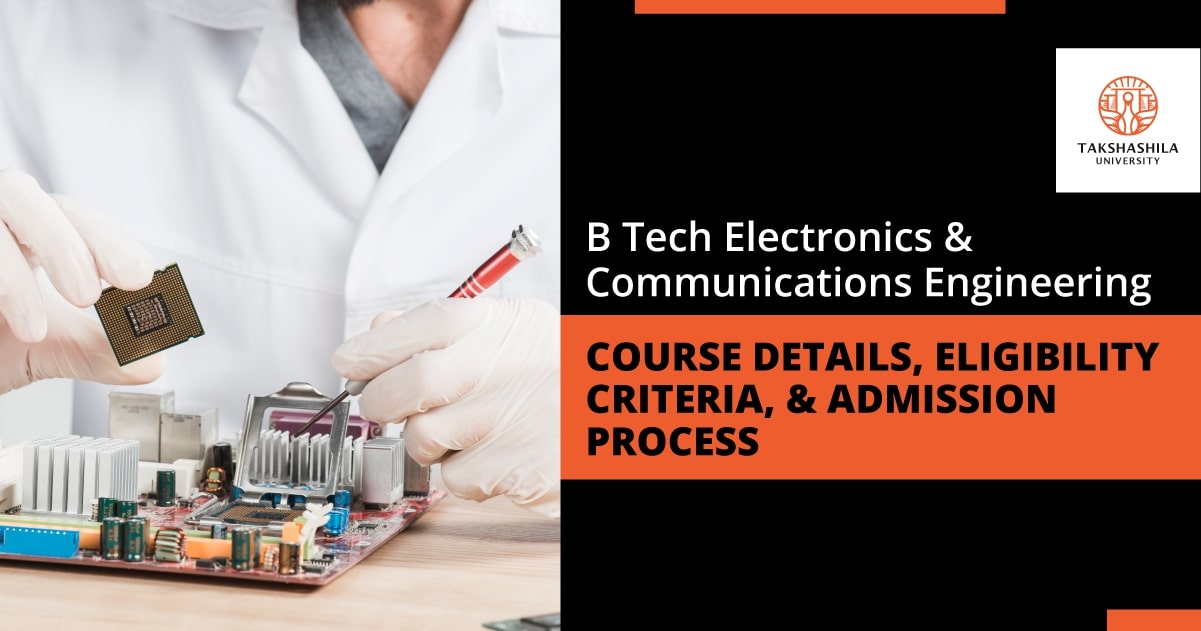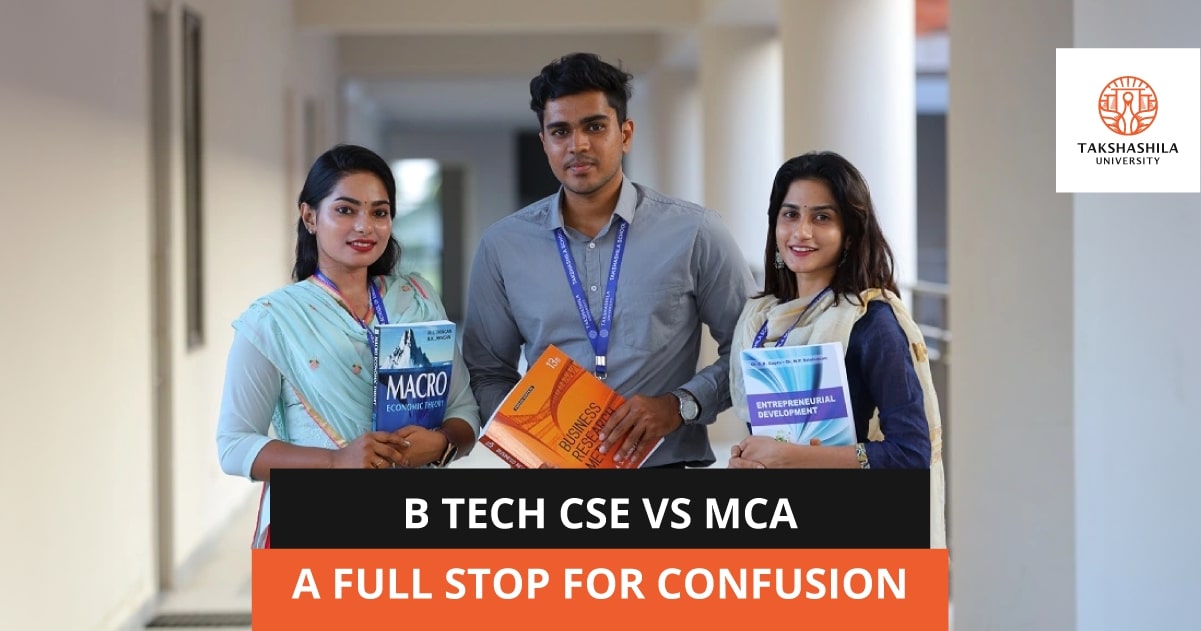Introduction
The Master of Computer Applications (MCA) at Takshashila University is a professional postgraduate program that aims to train students in the practical application aspects of computer science.
This program is well-suited for individuals who wish to pursue careers in software development, data management, or information technology administration.
This article analyses the course to cover its content, eligibility, selection process, skill development opportunities, cost of studying, and employment opportunities after pursuing an MCA degree.

Who is Eligible for Master of Computer Applications?
The Master of Computer Applications (MCA) is a sought-after postgraduate program designed to prepare students for advanced computer science and IT careers. As with every course, the admission requirements for MCA programmes may differ from one university to the other. Nonetheless, there are standard entry qualifications that applicants pursuing the MCA courses must satisfy. Here are the general eligibility criteria for enrolling in an MCA program:
Educational Qualifications
Bachelor’s Degree: The first requirement for an MCA applicant is to possess a bachelor’s degree from a recognised university. This degree can be in any discipline, although specific fields are often preferred:
- BCA (Bachelor of Computer Applications)
- B.Sc. (Bachelor of Science) in Computer Science, Information Technology, or related fields
- B.Tech/B.E. (Bachelor of Technology/Engineering) in relevant disciplines
- B.Com. (Bachelor of Commerce) or B.A. (Bachelor of Arts) with relevant additional coursework or experience.
Minimum Marks:
Many establishments expect applicants to have a minimum average grade for the undergraduate degree, which is between 50%-60%. This requirement helps keep a cheque on the candidate’s academic performance to some extent.
Mathematics Requirement
Most MCA courses admit candidates based on prior mathematics learning at 10+2 or undergraduate programme. This is because the MCA curriculum embraces mathematical and algorithmic concepts that CA spans as its core practice area.
Entrance Examinations
National/State Level Exams: Sometimes, a specific score on the entrance test is required to get admission to the MCA course. Some of the prominent entrance exams include:
- NIMCET (NIT MCA Common Entrance Test)
- MAH MCA CET (Maharashtra MCA Common Entrance Test)
- TANCET (Tamil Nadu Common Entrance Test)
- Other university-specific entrance exams
Other entrance tests are conducted specially for universities
Most of these tests are in areas of mathematics, logical ability, computer knowledge and proficiency in the English language.
Additional Criteria
Personal Interviews and Group Discussions:
Specific centres may have systems that entail face-to-face interviews and organised group discussions. These aim to determine the candidate’s communication skills, problem-solving ability, and fitness for the programme.
Work Experience:
Although the student doesn’t need to have experience working in an IT or computer science-related job, it will be helpful for the candidate. It may help them get admission more accessible if the course demands it.
Reservation Policies:
Reservation policy is widely practised in various institutions, depending on government norms in India. SC/ST/OBC candidates are given preference, and their eligibility criteria might be different and may cover reserved vacancies.
Preparatory Steps
Entrance Exam Preparation:
It is recommended that each candidate be well prepared for entrance examinations, in which they will be tested on mathematics, logical reasoning, computer knowledge, and proficiency in English. Many informal tutors and online services provide preparation and sample tests.
Documentation:
Ensure the following are in order: certificate/diploma of the previous institution, entrance examination results, identification card and any other certificate as required.
Application Process:
Get informed on the application dates and processes of the institutions of your choice, and fill out the application forms correctly and on time.
Course Overview: Master of Computer Applications
The MCA Program covers a variety of computer applications, including software engineering, database management, and networking.
Skill Enhancement: Beyond the Curriculum
As for abilities development seems to be the matter of the utmost significance in the student’s practice; the students are invited to practice skills onboard as well:
Certifications:
- Software Development Professional Certified (CSDP): To obtain this skill, one must demonstrate software practices.
- Data Science Certifications: It includes all courses that focus on the analytics and learning of the machine.
- Cloud Computing Certifications are training in AWS, Azure or Google through relevant courses.
Workshops and Seminars:
- Enrol in industry workshops to keep pace with developments within different scientific and technological areas.
- Join hackathons to use the education obtained.
Internships:
- Industry Internships: Practice in practical implementation of information technologies in the field of software engineering.
- Research Internships: Involvement in research projects allows a better understanding of the targeted audience and the development of the portfolio.
Can I do MCA Without Maths?
A Master of Computer Application (MCA) course is quite popular and is mainly opted for by the computer science and IT working crowd to upgrade their careers. Prospective students often wonder whether they can pursue an MCA if they have a mathematics background. Upon looking into this question, it can be seen that the response to this question is based on the particular college’s admission policies.
General Admission Requirements for MCA with Maths
Undergraduate Degree:
For instance, most universities expect their candidates to have obtained at least a bachelor’s degree in other recognised fields. A typical bachelor’s degree needs to be completed with a minimum aggregate score of usually around 50 -60%.
Mathematics Background:
Historically, several MCA programs have insisted that applicants should have taken mathematics at 10+2 or the undergraduate level. This is because the MCA syllabus consists of advanced mathematical concepts, and knowing about mathematics helps one appreciate these topics.
Entrance Examinations:
In India, applicants to these institutions usually have to take entrance tests such as NIMCET, MAH MCA CET, or any other university-oriented examinations. These tests mostly have sections on mathematics, reasoning, and computer awareness, among other aspects.
MCA Without Mathematics
Interestingly, while having a background in mathematics is normal, it is a matter of concern that some…
Some courses, such as Masters of Computer Applications, popularly known in short as MCA, often require solid mathematical knowledge. Therefore, emigration from one country to another is fundamental to the globalisation of the international student’s wish.
Bridge Courses:
Some universities provide bridge or preparatory mathematics programs for students who need the appropriate background. These classes aim to give the students adequate mathematical knowledge before the commencement of the main MCA program.
Alternative Eligibility Criteria:
Some institutions may accept specific other qualifications or work experience in the place of lacking mathematical education. For instance, if you have worked in the IT field or obtained relevant certificates, you can join.
Flexible Admission Policies:
Admission criteria, however, vary. Some private universities that offer distance learning courses do not require a mathematical background. It is advisable to approve the specific requirements of every school of interest.
Recommendations
Research Institutions:
Carefully find out what the requirements are when it comes to admission to any college or university that interests you. Search for those who accept such students.
To Ensure a Successful Attempt at Entrance Exams:
If maths is one of the subjects in the entrance examinations, it would be wise to either enrol in preparatory classes or engage in self-study focused on mathematics. That can enhance the chances of positive admission.
Seek Informational Interviews:
Choose academic advisors or admissions advisors at the universities that are most suitable for you. They can fulfil the detailed requirements and the possible preparation programs.
To sum up, although there is a classic requirement of minimum knowledge of mathematics for any MCA program, those who do not possess such a background can still explore other opportunities. By doing some homework and proper planning, you should be able to locate an avenue that will enable you to study an MCA and progress in your career within the IT and computer science profession.
How to Take Admission to MCA
The steps taken in the application process for the MCA program include the following:
- Application Submission: Complete the online application form and upload all relevant attachments, including the academic transcripts, admission test results, and other required documents.
- Entrance Exam: Gain the required score when expecting to pass the relevant entrance exam set for the candidate.
- Counselling Process: Those short-listed may be offered Counseling towards final admission.
- Final Selection: The candidates are usually offered admission after all the mentioned activities have been performed successfully.
Financial Considerations and ROI
Mastering the economics and finances of the MCA is very important for those who intend to grasp it.
Cost of Education:
Tuition Fee:
On average, the tuition fee for the MCA program varies between INR 60,000 to 1,50,000 per year.
Additional Costs:
Other costs that should be expected include textbooks and materials as well as living expenses, which may range from INR 15,000 to 30,000 per year.
Potential Earnings:
| Role | Average Salary (INR) |
| Software Developer | 5,00,000 – 15,00,000 |
| Data Scientist | 8,00,000 – 20,00,000 |
| Systems Analyst | 6,00,000 – 18,00,000 |
| IT Project Manager | 10,00,000 – 25,00,000 |
Return on Investment (ROI):
If you decide to pursue MCA, you will receive a huge ROI as more IT professionals are in demand. The immediateness of employment in diverse industries upon graduation makes IT courses worth taking.
Make the Right Decision – Join Takshashila University!
Join Takshashila University to Explore New Opportunities!
Ready to advance your academic journey? The MCA program here at Takshashila University prepares a student best for work in technology after graduation. We have experienced faculty and excellent facilities to support quality learning.
Apply now to step into tomorrow and lead us today, tomorrow, and beyond. Contact our counsellor today to learn how to apply and start working on computer applications.
Conclusion
The Master of Computer Applications course will give chances to those who want to progress professionally in the IT and software development industry.
The program allows students to apply what they have learnt in class in actual situations, so the grads are prepared for the fast-changing world of technology.
It is time to embrace and be part of the most advanced technology at Takshashila University!
FAQ
1: What are the course details for the MCA or Master of Computer Applications course?
This course takes three years and aims to embrace students with adequate knowledge of computer applications and software. The subjects taught are fundamentals such as computing, languages, databases, engineering of all kinds, and web and mobile applications. Furthermore, students use practical projects, internships, and seminars to improve their practical experience. It is offered with a final project or dissertation, enabling the learner to solve real-life IT sector problems.
2: What factors must you consider when applying for admission to an MCA programme?
To participate in an MCA programme, students usually require the essential qualification of holding a bachelor’s degree in any stream with minimum marks (usually around 50-60%). Most institutions have standardised that candidates must have done math at the 10+2 level or in their university. Some universities may also accept candidates with computer science or information technology backgrounds. Furthermore, different institutions can organise entrance exams, and students should focus on specific requirements in the concrete programmes.
3: How is a candidate admitted into an MCA programme?
The procedure for admission to an MCA programme may contain the following steps. First, the candidate must fill out an online application form and send the necessary documents: academic records, motivation letter and recommendation letters. Several places hold entrance exams, and the would-be students must apply and take these tests. Those qualifying may have to undergo an interview or a counselling session after the examination has been written. Tertiary selections are usually based on the results of the entrance examination, achievement in school, and interview, depending on the selection model of the relevant institution.
4: How long does it take to complete an MCA program?
The MCA course usually takes three calendar years or six semesters to complete the Master’s in Computer Applications. There is a combination of lectures, seminars and self-study with projects and internships to be performed throughout the semesters. Depending on the institution, some may offer part-time or distance learning, which may take longer. The students also expect time management and student-faculty and student-student interactions to get the most out of the course.
5: What are the industry prospects for those who have graduated from an MCA programme?
Several options are available to the graduates of a Master of Computer Applications (MCA) programme. There are numerous and widespread job titles that one can come across; some of them are software developer, systems analyst, web developer, database administrator and IT project manager. Other graduates are employed in somewhat developing sectors, including data analytics, artificial intelligence, and cybersecurity. Furthermore, there are opportunities for MCA graduates in government organisations, educational institutes and consultants. This makes an MCA course provide a chance to get successful and paid job opportunities in technology fields and other related industries.






